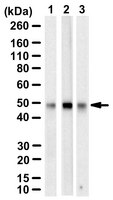A promoter-proximal transcript targeted by genetic polymorphism controls E-cadherin silencing in human cancers
Giuseppina Pisignano 1 , Sara Napoli 1 , Marco Magistri 1 , Sarah N Mapelli 1 , Chiara Pastori 1 , Stefano Di Marco 1 , Gianluca Civenni 1 , Domenico Albino 1 , Claudia Enriquez 1 , Sara Allegrini 1 , Abhishek Mitra 1 , Gioacchino D'Ambrosio 2 , Maurizia Mello-Grand 3 , Giovanna Chiorino 3 , Ramon Garcia-Escudero 1 4 , Gabriele Varani 5 , Giuseppina M Carbone 1 , Carlo V Catapano
Nat Commun
8
15622
2016
Kivonat megmutatása
Long noncoding RNAs are emerging players in the epigenetic machinery with key roles in development and diseases. Here we uncover a complex network comprising a promoter-associated noncoding RNA (paRNA), microRNA and epigenetic regulators that controls transcription of the tumour suppressor E-cadherin in epithelial cancers. E-cadherin silencing relies on the formation of a complex between the paRNA and microRNA-guided Argonaute 1 that, together, recruit SUV39H1 and induce repressive chromatin modifications in the gene promoter. A single nucleotide polymorphism (rs16260) linked to increased cancer risk alters the secondary structure of the paRNA, with the risk allele facilitating the assembly of the microRNA-guided Argonaute 1 complex and gene silencing. Collectively, these data demonstrate the role of a paRNA in E-cadherin regulation and the impact of a noncoding genetic variant on its function. Deregulation of paRNA-based epigenetic networks may contribute to cancer and other diseases making them promising targets for drug discovery. | 28555645
 |
















